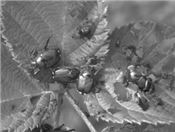Japanese Beetles Now Active

Figure 1. Initial Japanese beetle colonizers recruit more through their feeding and pheromones, so early control is important.
Photo courtesy Ric Bessin, UK
DR. RIC BESSIN
LEXINGTON, KY.
Dr. Dan Potter reported seeing adult Japanese beetles. This is the first report that I have received and signifies the start of the Japanese beetle season. High populations of Japanese beetle were observed in many locations in Kentucky in 2018, and I expect 2019 will be similar to last year. Initial Japanese beetle colonizers will begin to recruit more beetles to their locations through leaf volatiles released while they feed, as well as with the pheromones they produce.
Generally, the use of Japanese beetle traps is strongly discouraged. While the traps can capture very large numbers of this pest, there can be large numbers of Japanese beetles attracted to the traps that are not captured. This results in increased plant damage in the vicinity of traps. The recommended approach is to monitor susceptible plants for initial signs of Japanese beetle activity and control then as needed.
There are a number of effective conventional and organic insecticides to control Japanese beetles on food and ornamental crops. One recently available organic insecticide is BeetleGone!, which is a new strain of Bt that is active against Japanese beetle adults. Dr. Dan Potter, UK Entomologist, has found BeetleGone! to be toxic to monach butterfly caterpillars, so caution is advised around monarch way stations. ∆
DR. RIC BESSIN: Extension Entomologist, University of Kentucky